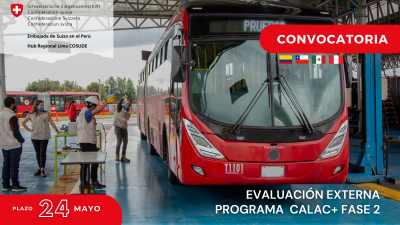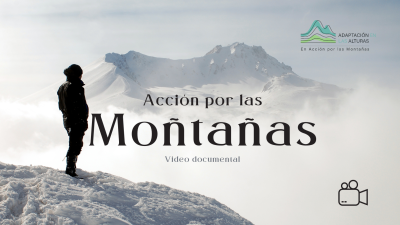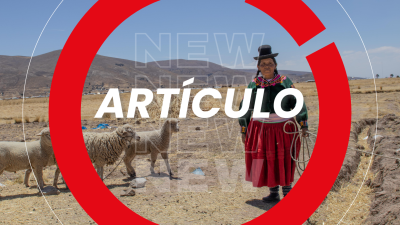“We are aware of the urgency to implement joint actions beyond national borders. Hence our contribution to the ENANDES+ project aims at increasing resilience to the growing impacts of climate variability in the short term, and climate change in the long term in six Latin American countries, strengthening their capacities for the provision of user-oriented climate services to the most vulnerable populations in the region,” said Paul Garnier, Ambassador of Switzerland in Peru, at the presentation of the ENANDES+ project.
Switzerland has been present in the region for more than half a century. A region with a great diversity of ecosystems, variable hydro-climatic conditions and very vulnerable to climate change. In line with its climate commitment, Switzerland is making a contribution of CHF 5.9 million to the World Meteorological Organization (WMO) through SDC, in order to scale up lessons learned in the region, with regard to capacities for climate services provision.

Julián Báez, Director of the WMO Regional Office for the Americas, highlighted Switzerland’s contribution through the lessons learned from the Climandes project, which was implemented 2012 to 2019 in Peru by the National Meteorological and Hydrological Service of Peru (Servicio Nacional de Meteorología e Hidrología del Perú – Senamhi), with the support of the SDC. Climandes was one of the eight projects prioritised by the WMO for the implementation of the Global Framework for Climate Services, in partnership with the meteorological services of Switzerland (MeteoSwiss) and Peru (Senamhi), academia, civil society, and the private sector.
In turn, Raul Polato, WMO Officer and ENANDES+ project coordinator, shared a brief presentation of the project, emphasizing the importance of collaborative work (South-South/Regional Cooperation) between countries (Colombia, Peru, Chile, Argentina, Bolivia, and Ecuador) that share particular climatic, environmental, and cultural characteristics, and that according to the United Nations Framework Convention on Climate Change (UNFCCC), are highly vulnerable to the effects of climate change. The sharing of knowledge and experience, as well as the development of adequate information and knowledge on weather, water, and climate will be key tools to address this vulnerability, thus contributing to effective and timely decision-making, the increase of resilience, and the design of appropriate adaptation practices.





The agenda included the round table, “Strengthening Climate Services in the Andean Region. A dialogue on challenges and solutions for climate adaptation”, which was moderated by María Julia Chasco, WMO Officer, and was formed by Paula Etala, National Director of Science and Innovation in Products and Services of the National Weather Service (SMN) Argentina; Hugo Mamani Ticona, Director of the National Meteorological and Hydrological Service (Senamhi) Bolivia and Permanent Representative; David Galarza, Deputy Executive Director of the National Institute of Meteorology and Hydrology (INAMHI) Ecuador; Guillermo Baigorria, Director of Senamhi Peru and Permanent Representative; and Manuel Keller from MeteoSwiss.
The panel of experts provided an insight into the perspectives of the countries and partners involved in the project, also the threats they are facing, the challenge of meteorology in a region such as the Andes, the importance of developing strategic cooperation in the region thus taking advantage of the potential of the projects that each country is implementing in different scenarios, as well as the challenges and actions to be taken at the transboundary level.
At the end of the event, it was remarked that ENANDES+ will work on strengthening the provision of hydro-climatic services, promoting resilience and the necessary adaptation to climate variability towards sustainable development. Switzerland’s contribution to the WMO will be fundamental to produce, communicate and evaluate weather, water and climate services as a driver for specific decision making, as well as to design actions to adapt to climate change, reduce vulnerabilities, increase the resilience of the most vulnerable populations and socio-ecological systems in the face of increasing hydro-climatic risks.
Further Information:
FS Construyendo Servicios Climáticos y Capacidades Adaptativas en los Andes. Contribución Suiza a ENANDES. (Span)
Useful links:
Web Organización Meteorológica Mundial
Web Federal Office of Meteorology and Climatology Meteoswiss








